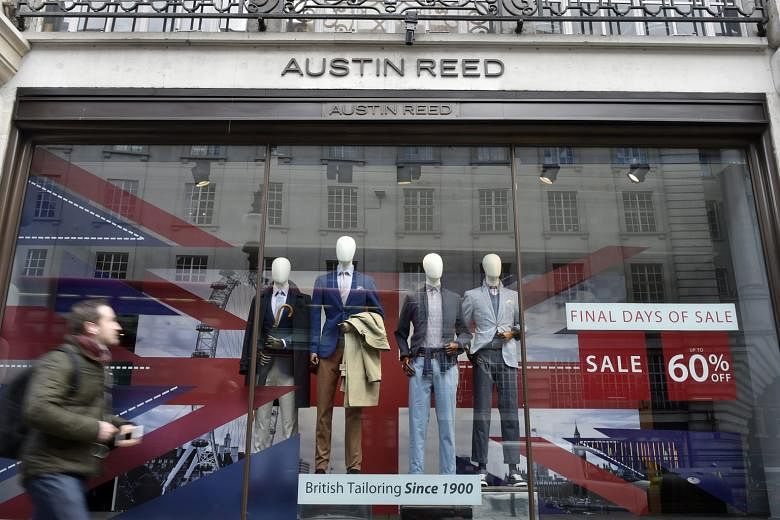LONDON • Britain's high-street retailers are feeling low.
In the last week alone, two stalwarts of the country's downtown shopping districts have moved to appoint administrators, similar to filing for Chapter 11 bankruptcy protection in the United States. The companies - department store operator BHS Group and formalwear retailer Austin Reed - are the latest victims of a deepening crisis, as shoppers gravitate to out-of-town malls or online retailers.
The slump is changing the fabric of a British institution that draws masses of shoppers to town centres on weekends with a collection of brands ranging from John Lewis department stores to apparel chains such as Marks & Spencer.
The decades-old concept is being upended by changing consumer behaviour and the inability of some retailers to remain relevant, a fate that contributed to BHS' downfall. Long-time occupants of prime retail space are moving out and in many cases, they are being replaced by discount chains and thrift stores.
"Traditional retail businesses with high-street stores have high fixed costs," said Mr Alan Stewart, chief financial officer of Tesco. "If their business starts changing and they don't have a capital structure that's sufficiently strong to withstand that change, then they're in a weakened position."
Higher disposable incomes are not translating into increased retail spending. Retail sales fell 1.3 per cent last month, according to the Office for National Statistics. The number of shoppers on British high streets declined 3.9 per cent last month, according to data from researcher Springboard. The decline is a "continuation of a longer-term trend caused by ongoing structural change within the retail industry", said Ms Helen Dickinson, chief executive of industry lobby group the British Retail Consortium. "Customers don't differentiate between buying online, on a mobile device or in-store."
Brick-and-mortar shops have been undermined by Britain's leading position in e-commerce. In Britain, 13.4 per cent of retail sales took place online last year, compared with a global average of 7.3 per cent, according to researcher Euromonitor.
BHS appointed administrators last Monday, putting 11,000 jobs at risk. The move followed the sale of the company for a mere £1 (S$1.97) last year by billionaire retail entrepreneur Philip Green. Analysts say BHS, a nearly nine-decade-old chain of 164 stores, failed to adapt its product line and business model.
Austin Reed, a 116-year-old suit seller, appointed an administrator on Tuesday, citing "cash flow difficulties arising from challenging retail market conditions." The move jeopardises 1,184 jobs.
While BHS had a dowdy image, even some high-street retailers with a more contemporary profile have struggled lately. British same-store sales at Primark, a discount fashion chain, fell about 1 per cent in the most recent quarter. The decline was the first in more than a decade, according to analysts.
Competitor Next lowered its forecast for growth in sales of goods at full price by 2 percentage points in the current financial year, a reversal from years of outperformance. It now sees revenue falling as much as 1 per cent or gaining 4 per cent at best, compared with a Jan 5 forecast for growth of 1 to 6 per cent. Next chief executive officer Simon Wolfson likened the year ahead to "walking up the down escalator".
If BHS were to shut down, it would be the biggest retail failure in Britain since Woolworths Group's demise in 2008. Since then, the country has lost several other long-time high- street chains, including HMV music stores, Comet electronics shops and Jessops photo centres.
"Unless retailers adapt... to meet the needs of today's consumer, we will see more high-profile casualties, as the combination of fragile economic conditions and the disruptive force of online retailing continues to bite," said Mr Jason Shorrock, vice-president of EMEA retail strategy at consultancy JDA.
Dr Neil Wrigley, professor of human geography at the University of Southampton, said the high street will survive. He said he saw signs of life in the artisanal bakers and butchers that are returning to some of these shopping districts in affluent regions in and around London.
"The high street is a complex urban ecosystem that has shown tremendous capacity to adapt, and it will continue to do so," he said.
BLOOMBERG

